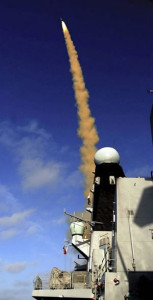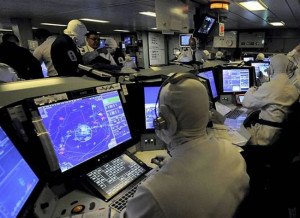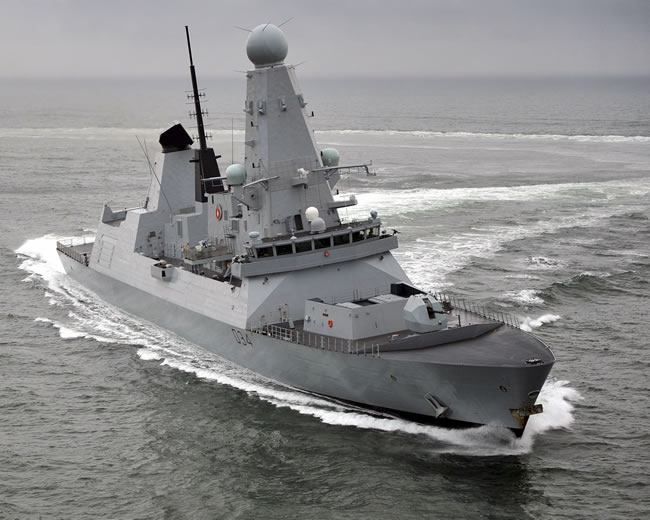British Destroyer to Participate in U.S. Missile Defense Trials

HMS Daring, fires her groundbreaking new air defence missile Viper for the first time.
Royal Navy Type 45 destroyers could join future missile intercept testing conducted by the U.S. missile defense agency (MDA), the British Ministry of Defence announced. MOD have teamed with UK industry-run Missile Defence Centre (MDC) to support the integration of Type 45 destroyers and its primary Sampson radar, as a sensor supporting ballistic missile defense networks.
The Sampson radar is part of the vessels’ Sea Viper air and missile defense system. These tests will task the Sampson radar in detecting and tracking ballistic targets but will not include actual intercepts of ballistic missiles with the Sea Viper missile system. Future integration of European sensors will come into effect when the US deploys its missile defense network in Europe, toward the second half of the decade, under the planned European Phased Adaptive Approach (EPAA).
The UK Missile Defence Centre was established in 2003 following signature of a Memorandum of Understanding between the UK and US on how to jointly conduct ballistic defence studies. By establishing a joint industry and MOD centre the UK government can best meet the UK’s long-term policy and research requirements.

Command and control center of HMS Diamond. Photo: MOD, Crown Copyright
The UK Missile Defence Centre was established in 2003 following signature of a Memorandum of Understanding between the UK and US on how to jointly conduct ballistic defence studies. Building on its relationship with the US Missile Defense Agency (MDA), the joint Ministry of Defence and industry-run UK Missile Defence Centre (MDC) has agreed to take part in a trial which will include, for the first time, a Royal Navy Type 45 taking part in a major research and development program. While there is no program to fit Type 45 with Theatre Ballistic Missile Defence (TBMD) capability, much of the MDC’s research over recent years has been geared towards understanding potential the Royal Navy’s newest destroyers may have in this arena.
“It will be a step change to be able to work so closely with such a ship in an emerging area of Defence. Working with an operational platform will make a significant difference to our level of understanding and could contribute both financially and technically towards any future programme” Simon Pavitt, Head of the MDC said.
The tests are part of an ongoing evaluation of possible integration of NATO assets into the US-lead AEGIS BMD setting, Last week
Raytheon reported about a recent trial that showed that a radar used by Dutch, German and Danish navies could provide target information to the interceptor. The current radar installed on the Dutch frigates is incompatible with the AEGIS/SM-3, The demonstration which took place at the Den Helder military test range validated a datalink that allows the missile to receive information from the Thales sensor while retaining the ability to communicate with Aegis combat ships used by the U.S. Navy.
Integration of Thales Nederland SMART-L long-range air and surface surveillance radar will provide a critical factor in the integration of European Navies into the future European missile defense system, given that 20 such radar (or their derivatives),are already deployed with frigates and destroyers of six NATO navies, including four DutchDe Zeven Provinciën class frigates, three German Sacsen frigates, six British Type 45 destroyers, four Horizon class frigates of the French and Italian navies and three Danish Navy Iver Huitfeldt class frigates.

Royal Navy Type 45 destroyer HMS Diamond. HMS Diamond, the Royal Navy’s third Daring class destroyer built by BAE Systems in Govan, made her first return visit to the River Clyde Wednesday 9th February 2011. Photo: MOD, Crown Copyright





0 komentar
Write Down Your Responses